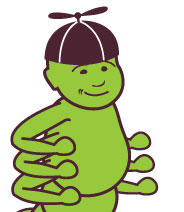
 |
|
|
March 2009
Welcome to the Doc Grubb newsletter for March 2009 One of the most important topics we can talk about happens this month, colorectal cancer awareness. One of my friends just had surgery for colon cancer so this topic really hits close to home for me. I just had my own “virtual” colonoscopy (VC) in early March at the National Naval Medical Center, Bethesda, MD. I had a colonoscopy about four years ago during which they found and removed several polyps, so my friend’s illness pushed me to schedule another one for myself. I was aware of virtual colonoscopies, but it was only when I went to schedule my appointment that I learned I could have a VC instead of a conventional colonoscopy (CC). I chose the VC for two reasons one was I could immediately return to work after the procedure, unlike the CC where you are sedated and must go home, and two, the CT scan used for the VC will also look at the surrounding structures in the abdomen, so if there are other problems the VC will identify them. The hardest part of the procedure was the bowel preparation, which means you have a clear liquid diet for the 24 hours preceding the VC, have to take a laxative to clear out your bowel and then have to take two different radiographic contrast materials so the CT scanner can visualize your bowel. I knew I was in trouble when I picked up a grocery bag of materials from our pharmacy. The procedure the following morning was just as described, that is, slightly uncomfortable, but overall much less than the CC. I received my official report the same afternoon which showed I had not polyps. My call to action for you is that, if you are over fifty years of age, or have a strong family history of colon cancer, or have symptoms such as blood in your bowel movements or abdominal pain…go schedule a colonoscopy!
International listening awareness month “God gave you two ears and one mouth. That means you should listen twice as much as you talk” One of the most important skills for all of us is “LEARN HOW TO LISTEN TO OTHERS.” Listening tells your friends, parents and teachers that you respect and care for them. It is especially important to listen in school because active listening translates into active learning. Being a good listener is also important on the playground or in the lunchroom, because if you listen to others you will be able to make friends and you can help your friends resolve conflicts that come out from misunderstanding what someone said.
HOW TO BE LOOK at the person who is talking.LISTEN, and don't interrupt. ASK questions to find out more.NOD, or say something to show you understand.REPEAT what you heard in your own words. Improving your listening skills takes practice and often hard work, but becoming an effective listener can literally change your life. Practice the five steps above until they come naturally to you — and get ready to be amazed by your results!
Music in Our Schools month Music In Our Schools Month, is a month-long event that started in 1973 to make people aware of how important music education is in our schools and community. The goal of this event is to stress the importance of quality music education in our schools and to enlist the support of teachers, students, parents, members of the community, organizations and individuals to become advocates of music education. What a great way to highlight how music affects education, not only in the music classroom itself, but also within the other classrooms and other disciplines as well! In the orient, you weren’t considered to be well-educated unless you could do beautiful calligraphy, draw and paint, write poetry and play a musical instrument. Even in the United States until recently EVERYBODY took music lessons. I can remember as a child going to piano and violin lessons. I’ve heard it said that everyone completes about having to go to music lessons but people who didn’t have to go to music lessons regret it even more. Unfortunately, with the money problems in almost every school system, music is one of the first subjects to be cut from the schedule. My son’s small school has a band, but because it is not funded by the school system, it is too expensive for most families to join. Classes only meet once a week and the teacher expects the children to have private lessons on their instruments (which they usually rent) IN ADDITION TO the time they spend practicing in school. I think music, like foreign languages, is extremely valuable for children. First of all, it reaches a different part of the brain. The left side of the brain is the part associated with math and reading and the right side of the brain is the part associated with music and art. By listening to music your children are working a different part of their brain, which will help them to use more of their whole brain. Secondly, there is an incredible amount of beautiful music in the world. By listening to a wide-range of world music your children will be exposed to sounds, rhythms, scales they would never hear otherwise. Again, what a great way to expand how your children’s mind work. Even if they don’t like the music, they will find that they listen to their own music differently. Great music is great music no matter where it comes from. National Nutrition Month
Most parents worry about nutrition. We worry about our kids eating enough of the right kinds of foods, especially fruits and vegetables. March is National Nutrition Month, so it's a good time to talk about healthy eating habits with your kids.
Make family mealtimes a priority: Plan healthy meals in advance to ensure that you are offering a wide range of healthy items. Research shows that children who eat with their family tend to have a healthier diet. In our family, we make it a priority to always eat dinner as a family.
Be flexible about food: Being overly restrictive about food can lead to an unhealthy preoccupation with food. Try not to use food as a reward or a punishment. Food is meant to nourish your body. Many battles over food will end up with your children making poor choices in what foods they eat. Pizza was never meant to be a breakfast treat. When you offer your children new foods to try, remember it can take five or six times of trying a food before they will accept as a routine part of their diet.
Involve your children in planning the family menu. Most children like to have control over their meals. Nothing will involve your children more in eating a healthy diet than letting them research and plan a healthy meal for the family. You still have the final say on the meal, but if they learn that having two or three healthy vegetables at a meal is important, that is great!
Move! A healthy diet is only part of a healthy lifestyle. Try to have the family do activities together such as walking after dinner, going on a picnic together, playing sports and so on. The key is to move!
Be a good role model: Your children will watch you and see what YOU eat. If you eat junk food, then all your credibility is gone when you tell them to eat healthy foods. You might like the fruits and vegetables even more than your children!
VOTE EARTH-YOUR LIGHT SWITCH IS YOUR VOTEThis year, Earth Hour has been transformed into the world’s first global election, between Earth and global warming. Saturday, March 28, 8:30-9:30pm. For the first time in history, people of all ages, nationalities, race and background have the opportunity to use their light switch as their vote – Switching off your lights is a vote for Earth, or leaving them on is a vote for global warming. Earth Hour began in Sydney in 2007, when 2.2 million homes and businesses switched off their lights for one hour. In 2008 the message had grown into a global sustainability movement, with 50 million people switching off their lights. Global landmarks such as the Golden Gate Bridge in San Francisco, Rome’s Coliseum, the Sydney Opera House and the Coca Cola billboard in Times Square all stood in darkness.
American Diabetes Alert Day The world is in the midst of a health crisis. Diabetes is rapidly becoming THE major health concern for the world. American Diabetes Alert Day is a one-day, “wake-up” call to inform the American public about the seriousness of diabetes. The American Diabetes Association encourages people to take a Diabetes Risk Test and find out if they, or their loved ones, are at risk for developing type 2 diabetes. The 21st annual American Diabetes Alert Day is Tuesday, March 24, 2009. Did you know? Nearly one-quarter of those do not know they have diabetes One in five Americans is at risk for developing type 2 diabetes
There are two types of diabetes: Type 1, juvenile onset diabetes, begins in childhood and is caused by problems with the pancreas making insulin. Type 2, or adult onset diabetes, is much more common and is primarily caused by a poor diet and being overweight. There are an estimated 57 million Americans who have pre-diabetes but not the full disease. Those with pre-diabetes have blood glucose levels higher than normal, but not high enough to be diagnosed with type 2 Diabetes. Early intervention via lifestyle changes such as weight loss and increased physical activity can help delay or prevent the onset of type 2 Diabetes. Early diagnosis is critical to successful treatment and delaying or preventing some of its serious complications such as heart disease, blindness, kidney disease, stroke, amputation and death. For many, diagnosis may come seven to ten years after the onset of the disease. African Americans, Latinos, Native Americans, and people who have a family history of the disease are at an increased risk for type 2 diabetes. You can lower decrease your risk of getting diabetes by doing a few simple things: If you are overweight, lose weight. Even losing 10% of your weight will greatly decrease your chance of developing diabetes Cut back on the sugars, including high fructose corn syrup, and fats you eat. Eat more fruits and vegetables, especially those grown locally and in season. Get more exercise. Even walking for 30 minutes a day will do wonders for your health.
ARRANGE A SUBSCRIPTION TO THE WORM’S EYE VIEW Our free newsletter “The Worm’s Eye View” is uploaded to the computer each month. Each issue includes valuable information for all members of the family as well as the inclusion of the most up-to-date information concerning medical research and treatments. As a subscriber you will be sent announcements of my new books, CD, and seminars at reduced prices and fees. Sign-up now. You should read my latest book, “Solving the Weight Loss Puzzle.” Please go to the order page and read part of the first chapter. You will learn a lot from this book why everyone has gained weight and the Three Secrets to normalize your weight.
|
|

